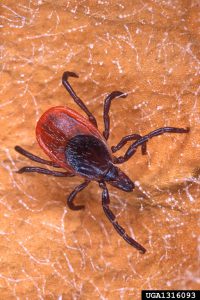You’ve embarked upon a hike to decompress, spend some much needed time outdoors, and get away from your multiple blue light emitting screens. Low and behold, you return home to later find one of the most infamous pests on the planet—a tick, burrowed into your skin, lapping up it’s bloodmeal for who knows how long. Capable of transmitting Lyme disease along with a number other of bacterial, viral, and protozoan pathogens, panic has already set in.

While following instructions for proper removal is a key first step, and consulting with a physician if you live in an area with a high incidence of tick-borne diseases, there is some exciting new research out of the Fikrig Lab at the Yale School of Medicine. Specifically, a new vaccine that may offer protection against Lyme and other tick-borne diseases.
This team of scientists was interested to learn more about the process of inducing immunity against the vector of Lyme disease, the black-legged or deer tick (Ixodes scapularis). How did they do this? Well, a laboratory-stage mRNA vaccine called 19ISP was developed. If you’re thinking, wait that sounds familiar… similar to the COVID-19 vaccines? You’re on the right track! Messenger RNA vaccines work by teaching our cells how to develop proteins that will trigger immune responses inside our bodies. Unlike the COVID-19 vaccines, which work by identifying spike proteins on the outside of the pathogen itself, this vaccine essentially works by teaching the immune system to recognize 19 selected proteins found in the ticks saliva.
The idea is that eventually some animals will develop resistance to initial or prolonged feeding. Generally, ticks will not begin transmitting pathogens (if present) until they’ve been feeding for a period of 24-48 hours. By causing detachment of the tick itself soon after biting or inducing redness and inflammation of the skin the tick is less likely to transmit disease.
In this study, guinea pigs were utilized and able to develop immunity quite rapidly. However, other animals such as mice were not. Moving forward, this team plans to test this mRNA vaccine in other animals like rabbits and eventually conduct studies on people who’ve already contracted Lyme disease to further assess whether they have antibodies already present.
Be sure to check out the recent publication for detailed information, mRNA vaccination induces tick resistance and prevents transmission of the Lyme disease agent.
For more information on tick identification and other helpful resources, see our previous UF Pest Alert: A Friendly Reminder About Ticks.
 0
0
